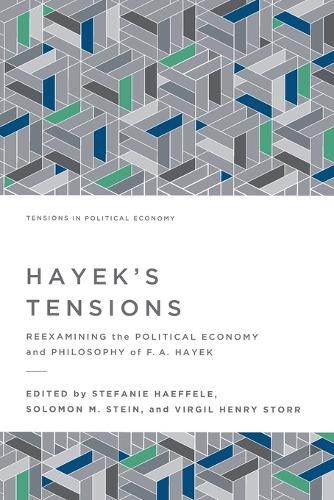Readings Newsletter
Become a Readings Member to make your shopping experience even easier.
Sign in or sign up for free!
You’re not far away from qualifying for FREE standard shipping within Australia
You’ve qualified for FREE standard shipping within Australia
The cart is loading…






This title is printed to order. This book may have been self-published. If so, we cannot guarantee the quality of the content. In the main most books will have gone through the editing process however some may not. We therefore suggest that you be aware of this before ordering this book. If in doubt check either the author or publisher’s details as we are unable to accept any returns unless they are faulty. Please contact us if you have any questions.
F. A. Hayek, a prominent 20th-century political economist in the Austrian tradition,
won the Nobel Prize in Economics in 1974 for his pioneering work on the theory of
money and economic fluctuations and on comparative institutional analysis. Hayek’s
research highlights the importance and dispersed nature of knowledge, advancing
an interdisciplinary approach to understanding human behavior. Like any great and
productive scholar, he left behind a body of work that includes tensions, flaws, and
inconsistencies that must be confronted by scholars looking to engage, critique, and
advance his distinctive project in political economy.
Hayek’s work is important but also open for contestation and improvement. Hayek’s
Tensions: Reexamining the Political Economy and Philosophy of F. A. Hayek presents
a critical assessment of Hayek’s research and ideas and identifies sources of tension
within his writing. The contributions to this edited volume include original chapters by
eminent scholars of complexity theory, of Austrian economics, and of Hayek himself.
The book’s key takeaway is that the research program Hayek developed continues as
an open-ended project, both as a social-scientific approach and as a classical liberal
vision of a free society, rather than as a static dogma or set of theories from a bygone
era. Taken as a whole, this volume identifies important questions and areas for future
research by the next generation of political economists.
$9.00 standard shipping within Australia
FREE standard shipping within Australia for orders over $100.00
Express & International shipping calculated at checkout
This title is printed to order. This book may have been self-published. If so, we cannot guarantee the quality of the content. In the main most books will have gone through the editing process however some may not. We therefore suggest that you be aware of this before ordering this book. If in doubt check either the author or publisher’s details as we are unable to accept any returns unless they are faulty. Please contact us if you have any questions.
F. A. Hayek, a prominent 20th-century political economist in the Austrian tradition,
won the Nobel Prize in Economics in 1974 for his pioneering work on the theory of
money and economic fluctuations and on comparative institutional analysis. Hayek’s
research highlights the importance and dispersed nature of knowledge, advancing
an interdisciplinary approach to understanding human behavior. Like any great and
productive scholar, he left behind a body of work that includes tensions, flaws, and
inconsistencies that must be confronted by scholars looking to engage, critique, and
advance his distinctive project in political economy.
Hayek’s work is important but also open for contestation and improvement. Hayek’s
Tensions: Reexamining the Political Economy and Philosophy of F. A. Hayek presents
a critical assessment of Hayek’s research and ideas and identifies sources of tension
within his writing. The contributions to this edited volume include original chapters by
eminent scholars of complexity theory, of Austrian economics, and of Hayek himself.
The book’s key takeaway is that the research program Hayek developed continues as
an open-ended project, both as a social-scientific approach and as a classical liberal
vision of a free society, rather than as a static dogma or set of theories from a bygone
era. Taken as a whole, this volume identifies important questions and areas for future
research by the next generation of political economists.